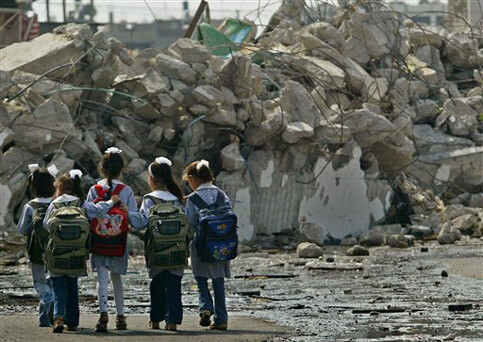Al Jazeera 7 August 2005

A general belief among Palestinians is that the Israeli plan to “disengage” from Gaza is primarily aimed at consolidating Israel’s grip on the West Bank. (PCHR)
The proposed expansion of illegal Jewish settlements in the West Bank has convinced many Palestinians, intellectuals and laymen alike, that peace with Israel is no longer within the realm of possibility. A general belief among Palestinians is that the Israeli plan to “disengage” from Gaza is primarily aimed at consolidating Israel’s grip on the West Bank.
Recent polls in Palestine have shown that a majority of Palestinians are convinced that a genuine peace with Israel - that is, one based on UN resolutions 242 and 338 and the land-for-peace formula - is no longer possible.
According to the Ram Allah-based Palestinian Centre for Policy and Survey Research (PCPSR), which conducts regular opinion polls in the West Bank, Gaza Strip and East Jerusalem, and more Palestinians are willing to accept the view that the Israeli-Palestinian conflict has reached the “point of insolvability”.
In an opinion poll conducted between 10-12 March, as many as 65% of Palestinians in the Occupied Territories said they did not believe that a “permanent peace with Israel was possible”. Only 3.1% of respondents said such a peace was possible.
Settlements factor
In his fight to persuade settler leaders and right-wing critics that “disengagement” from Gaza was in their best interest, Prime Minister Ariel Sharon said on many occasions that the pullout, scheduled for July, would only lead to the “strengthening” of Ariel, Maale Adumim, Gush Itzion and other Jewish colonies in the West Bank.
But the “strengthening” of these settlements would, Palestinians and the international community argue, effectively undermine the possibility of establishing a viable Palestinian state in the West Bank.
The creation of such a state is the centrepiece of President Bush’s “vision” of seeing two states living peacefully side by side in Palestine, Israel and Palestine. Moreover, Israel’s relentless bid to isolate Arab-East Jerusalem with an impenetrable belt of Jewish-only settlements is already rendering Palestinian hopes of making the city their future capital unrealistic, Palestinian analysts say.
With this sense of pessimism being constantly fed by provocative Israeli decisions, such as the construction of the West Bank separation barrier, many Palestinians are unsurprisingly resorting to divine predictions to interpret the seeming irreconcilability of the conflict with Israel.
Perpetual strife
Recently a Palestinian legislator told Aljazeera.net that the creation of an independent and viable Palestinian state in the West Bank and Gaza incorporating East Jerusalem was no longer a realistic option.
Hatim Abd al-Qadir also recognised that the “one state solution” where Jews and Palestinians could live equally as citizens in a unitary democratic state in all of mandatory Palestine (Israel, West Bank and Gaza), wouldn’t be possible because of Israel’s vehement rejection of the idea. “So all is left is perpetual strife until God decrees a solution,” Abd al-Qadir said. His dark view of the situation seems to be accepted by many Palestinian intellectuals.
Atif Adwan is a professor of political science at the Islamic University of Gaza. He says “all Israeli actions and behaviours in the West Bank and Gaza Strip since 1967 have consistently demonstrated that Israel is not interested in a true peace with the Palestinians”.
Adwan says a simple examination of Israeli behaviour towards Palestinians shows that the Jewish state is interested first and foremost in “imposing its will and fait accompli”, regardless of what Palestinians think.
Religious conflict
Given the failure of UN resolutions demanding Israeli withdrawal and the ground reality, are the Palestinians then resigned to whatever “settlement” Israel imposes on them? Adwan says no. “We have to keep in mind that Palestine is not just another piece of real estate. Palestine is Jerusalem and Jerusalem is al-Aqsa Mosque, without which Islam loses an important and conspicuous part of it,” he said.
Adwan argues that what prompted Muslims in the 12th century, under the leadership of Salah al-Din, to wage wars against the Crusaders would eventually prompt Muslims to do the same to dislodge Israel from Jerusalem. He believes the conflict could morph into a straightforward religious conflict between Muslims and Jews. “It is already a religious conflict. In fact the religious aspect of the conflict has always been there.
“We have to remember that Zionism is nothing but an outer cloak for Talmudic Judaism. Even today, the strongest and most vehement opposition to Israel’s planned withdrawal from Gaza and some parts of the West Bank stems from religious considerations.” Religious Zionism, it may be recalled, views Israel as the first flowering of redemption.
Khalid Amayreh is a journalist based in the occupied West Bank. This article was originally published on August 6, 2005 by aljazeera.net and reprinted on EI permission.
Related Links





